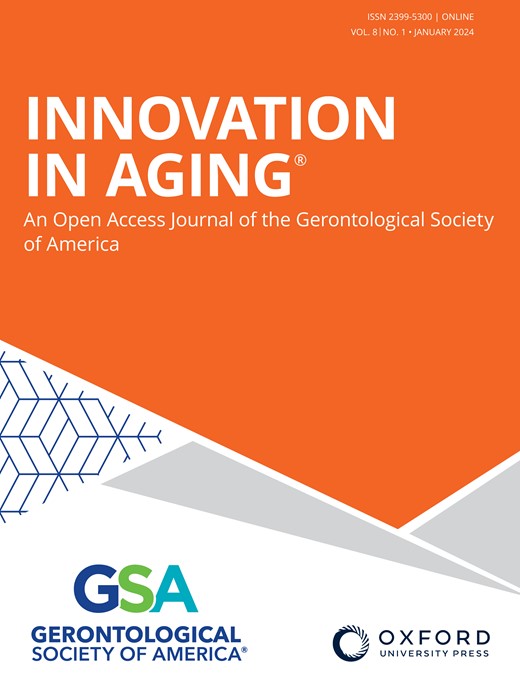GERIATRIC WORKFORCE ENHANCEMENT PROGRAMS AS AAA AGE-FRIENDLY INITIATIVES PARTNER
IF 4.9
3区 医学
Q1 GERIATRICS & GERONTOLOGY
引用次数: 0
Abstract
Abstract The Health Resources and Services Administration funded 48 Geriatric Workforce Enhancement Programs (GWEPs) to partner with community-based organizations in addressing gaps in health care for older adults, promoting Age-Friendly ecosystems, and addressing social determinants of health. This paper discusses three GWEPs collaborative projects with Area Agencies on Aging (AAAs) that deliver community-based programs . The University of Utah’s GWEP, a rural AAA, the Alzheimer’s Association, and the Utah Department of Veterans and Military Affairs provided a hybrid Dementia Caregiver Conference to six counties, reaching 65 in-person attendees and 10 senior centers online. Attendees agreed the content met their educational needs, would positively influence care, and was motivation to form a caregiver coalition. The University of Louisville Trager Institute (Trager), AAA, and Kentucky Coalition for Healthy Communities provided focused regional training and sharing of community resources utilizing the Project ECHO training model for 11 AAA regions, reaching 412 home and community-based services professionals. The University of North Texas Health Science Center, AAA, and emergency management services expanded evidence-based programs in falls prevention, medication safety, and dementia caregiving, serving an additional 23 urban postal codes, rural counties, and over 1,900 individuals. These examples utilize unique community relationships and partnership strategies to identify local needs, maximize older adult and family caregiver engagement, measure outcomes, and achieve GWEP goals to educate diverse, underserved and rural communities.作为 AAA 老龄友好倡议合作伙伴的老年医学劳动力提升计划
摘要 美国卫生资源与服务管理局资助了 48 个老年劳动力提升计划(GWEPs),以与社区组织合作,解决老年人医疗保健方面的差距,促进老龄友好生态系统,并解决健康的社会决定因素。本文讨论了三个 GWEPs 与提供社区计划的老龄地区机构(AAA)的合作项目。犹他大学的 GWEP、一个农村 AAA、阿尔茨海默氏症协会和犹他州退伍军人和军事事务部为六个县提供了一个混合痴呆症护理人员会议,有 65 人亲自参加了会议,10 个老年中心在线参加了会议。与会者一致认为,会议内容满足了他们的教育需求,将对护理工作产生积极影响,并促使他们成立了护理者联盟。路易斯维尔大学特拉格研究所(Trager)、AAA 和肯塔基州健康社区联盟利用 ECHO 项目培训模式为 11 个 AAA 地区提供了重点地区培训和社区资源共享,共有 412 名家庭和社区服务专业人员参加了培训。北德克萨斯大学健康科学中心、AAA 和应急管理服务机构扩大了预防跌倒、用药安全和痴呆症护理方面的循证计划,为另外 23 个城市邮政编码、农村县和 1,900 多人提供了服务。这些范例利用独特的社区关系和合作战略来确定当地需求,最大限度地提高老年人和家庭护理人员的参与度,衡量成果,并实现 GWEP 目标,以教育多样化、服务不足的社区和农村社区。
本文章由计算机程序翻译,如有差异,请以英文原文为准。
求助全文
约1分钟内获得全文
求助全文
来源期刊

Innovation in Aging
GERIATRICS & GERONTOLOGY-
CiteScore
4.10
自引率
0.00%
发文量
72
审稿时长
15 weeks
期刊介绍:
Innovation in Aging, an interdisciplinary Open Access journal of the Gerontological Society of America (GSA), is dedicated to publishing innovative, conceptually robust, and methodologically rigorous research focused on aging and the life course. The journal aims to present studies with the potential to significantly enhance the health, functionality, and overall well-being of older adults by translating scientific insights into practical applications. Research published in the journal spans a variety of settings, including community, clinical, and laboratory contexts, with a clear emphasis on issues that are directly pertinent to aging and the dynamics of life over time. The content of the journal mirrors the diverse research interests of GSA members and encompasses a range of study types. These include the validation of new conceptual or theoretical models, assessments of factors impacting the health and well-being of older adults, evaluations of interventions and policies, the implementation of groundbreaking research methodologies, interdisciplinary research that adapts concepts and methods from other fields to aging studies, and the use of modeling and simulations to understand factors and processes influencing aging outcomes. The journal welcomes contributions from scholars across various disciplines, such as technology, engineering, architecture, economics, business, law, political science, public policy, education, public health, social and psychological sciences, biomedical and health sciences, and the humanities and arts, reflecting a holistic approach to advancing knowledge in gerontology.
 求助内容:
求助内容: 应助结果提醒方式:
应助结果提醒方式:


